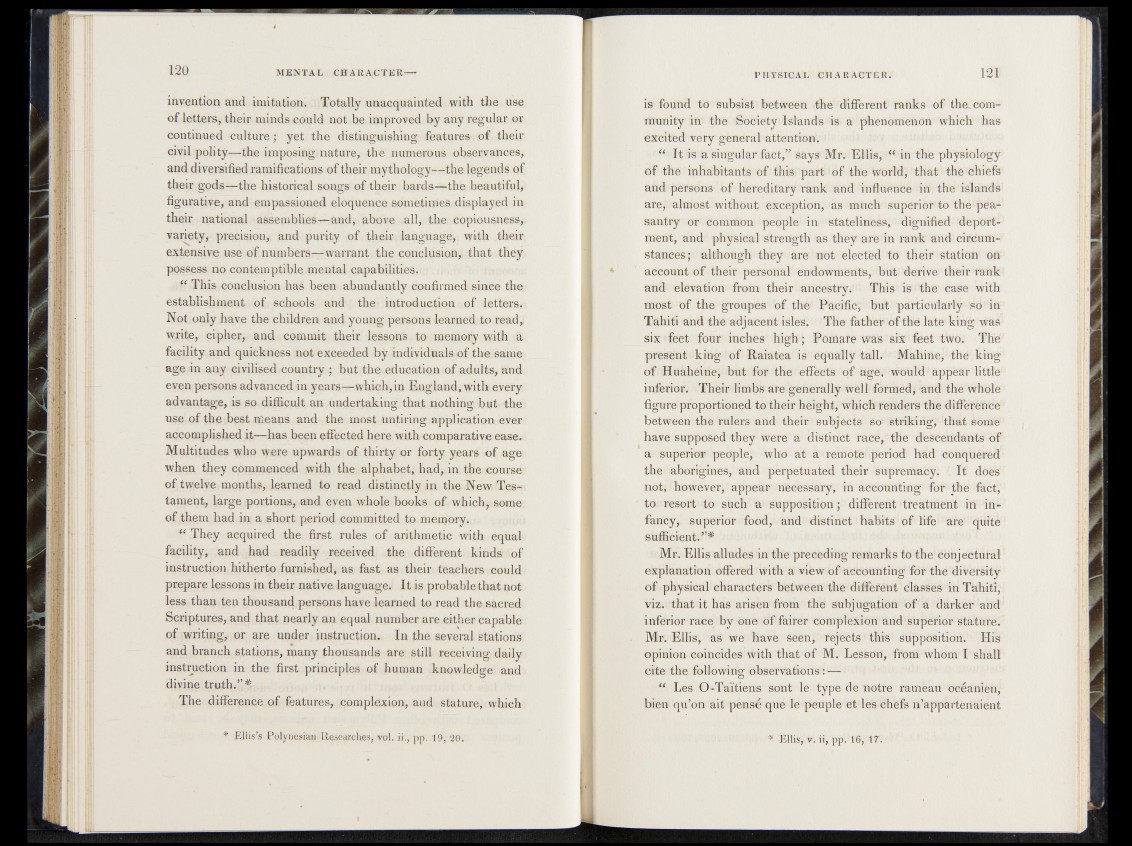
invention and imitation. Totally unacquainted with the use
of letters, their minds- could not be improved, by any regular of
continued culture j yet the distinguishing features, of thew.
civil polity—the imposing?nature, .the numerous observances,
and diversified ramifications of their>mythologyf7-rthe legends of
their gods-rthe historical songs of their bards—the beautiful,
figurative, and empassioned eloquence sometimesdisplayed in
their national assemblies—and, above all, the copiousness,;
variety, precision, and purity of their. language, with their
extensive use of numbers—warrant the conclusion,; that .they-
possess no contemptible mental capabilities. ;
| This conclusion has been abundantly confirmed since the
establishment: of schools and the introduction of letters,-,
Not only have the children and young personsIfiaroed/jto read,?
write, cipher, and commit their lessons, to memory with a.
facility and quickness not exceeded by individuals of the, same
age in any civilised, country; but the..education of adults, and
even persons advanced in years-—which, in England, with every
advantage, is so, difficult an undertaking that nothing but the
use of the best means and the most untiring application ever
accomplished it—has been effected here with comparative ease.
Multitudes wUp were upwards of thirty or forty, years of age
when they coipnenced with the alphabet, had,in the course
of; twelve months, learned to read distinctly in the New Tes*
tament, large portions, and even whole books of. which, some
of them had in a,short period committed to meug‘oryk;
■“ They acquired the first rules of arithmetic with equal
facility, and had readily received the different kinds:-of
instruction hitherto furnished, as fast as their teachers ;could
prepare lessons in their native language. It is probable that not
less than ten thousand persons have learned to read the sacred
Scriptures, and that nearly an equal number are either capable
of writings pr are under instruction. In the several stations
and branch stations, many thousands are still receiving daily
instruction in the first principles of human knowledge and
divine truth.”
The difference, of, features, complexion, and stature, which
* Ellis's Polynesian ^Researches, yol. ii,7 pp, 19, 20.
is found to subsisti between the different ranks of the>community
in the Society Islands is & phenomenon which has
excited very general| attentioUv <
u ‘ It is a singular»fact,” says Mr. Ellis, ** in the physiölogy'
df the inhabitantsiof ^h^Jpatt * of th e World,-that the chiefs
and^pëtsôus of hereditary rank and influence ’in the islands
are, almost without ‘exception, -as much 'Superior* to the peàs
santry or-Gominbn;ipeOple!4rv;;-StatelinfesS, :d%riffied deport*
ruent, and* physical strèn^tMins fhe^'trddn ronk andiciïeüffi0
stances|ÖÉlthough they; lUre -> not véleOted? tö thëir-stâtion on
account of their personal endowments, but; derive their rank
and elevation from their ancestry.1 This; is th ë 'CaSe With
most of the groupes of the3 Padifk$5 bu$'-^àftàddlit*i$*r «ifir*
Tahiti and the adjacent is le s .T h e father of the late* king wad
six *feet four j inehês*! high»! Pomare was &HRfeet two. TWer
present king of Raiatea iS’eqnally tall. MaMheiJ’the
ofi HuéÉhêtóel' but for the effects o f fegd,'Would^appear little4
inferior. Their limbs are generally well;f©rmed, and the: whole
figure proportioned to their height, which renders the difference'
between the rulers*and theinrSuh|écisvêo^%tMMfig^Rjj^ âomê0
have supposed they were a* ffiStóèt ;faèé,' the dteseMdàKSS'ôf
aiïSupirioS3 peöple| vvlïb ut Md öOnqfiékelr
theonborigines,*aüd3 perpetuated iMeir %iapfè®aCy: âôèrS
noti howévêr! appear necessary, in acebnntitó^^fofi^thë fhèt!‘
to resort to such-O. supposition ; different‘tfeUtifiétti <in infancy,
superior food, and distinct 'habits o f life u re !,düité
sufficient.”*
Mr. Ellis alludes in the preceding remarks tbStM*MhjeétüMï'
explanation offered with a view'of%Ch0Unting‘*for thé'diversity
of physical characters between the different classeSin Tahiti,
viz. that it has arisen from thé subjugation of a darker and
inferior race by one df fairer <onipielion and*SüpMor statürei
Mr. Ellis, as we have sélnf rejects * thiSs supposition. Hid
opinion coincides with that Of ■ M. LëSSOrf, I* Shall
cite the following observations : -
if Les O-Taïtiens sont le type de notre rameau océanien!
bien qu’on ait pènsé que le peuple et les chefs n’appârtenaiént
* ElliSj V. iï, pp:l6, 17.